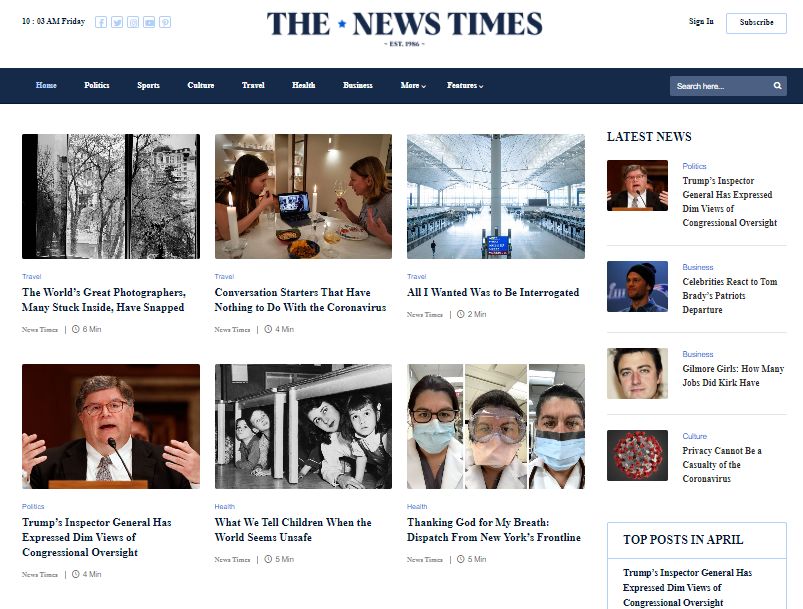The Significance of Fact-Checking on the planet of News Online
The occurrence of false information in today's online news landscape has actually gotten to disconcerting degrees. Fact-checking companies play a crucial role in combating this trend. They validate insurance claims and enhance the reputation of journalism. Nevertheless, the performance of these companies often rests on their methods and public perception. As audiences navigate this intricate environment, the ramifications of their searchings for might form the future of news consumption and trust fund. What does this mean for the integrity of info progressing?

The Surge of Misinformation in the Digital Age
How has the arrival of digital technology contributed to the spread of misinformation? The quick development of the net and social media sites systems has actually promoted the dissemination of info at an extraordinary speed. Users can share short articles, video clips, and point of views with a mere click, usually without validating the material's accuracy. Formulas prioritize thrilling or emotionally charged product, causing a proliferation of misleading narratives that record attention.
Furthermore, the privacy paid for by digital systems allows individuals to spread false information without responsibility (stnews.live). Misinformation flourishes in echo chambers, where users are subjected mainly to point of views that strengthen their ideas, better setting falsehoods. The saturation of information can bewilder users, making it challenging to recognize legitimate sources from unstable ones. False information has actually come to be a pervasive issue in the electronic landscape, affecting public opinion and count on in genuine news sources.
The Function of Fact-Checking Organizations
Fact-checking organizations play a vital function in improving the reputation of journalism by confirming cases made in news reports. Their initiatives are crucial in combating misinformation, guaranteeing that exact information prevails in the digital landscape. By holding media electrical outlets answerable, these organizations contribute considerably to informed public discussion.
Enhancing Credibility in Journalism
While misinformation proliferates in the digital age, fact-checking organizations play a necessary duty in improving the reliability of journalism. These companies thoroughly validate insurance claims made in news short articles, public statements, and social media messages, making sure that details shared to the public is accurate and reliable. By offering independent evaluations, they act as a crucial resource for journalists, assisting them keep high criteria of stability. Furthermore, their initiatives promote transparency in media, promoting public trust. As target markets become significantly discerning, the visibility of trustworthy fact-checking entities can identify trusted news resources from those that may spread falsehoods. Inevitably, the commitment of fact-checking companies to support reliability is vital for the health of democratic discussion.
Combating Misinformation Efficiently
As misinformation remains to spread swiftly across electronic platforms, the function of fact-checking companies ends up being progressively vital in the fight for precise info. These organizations serve as watchdogs, inspecting cases made by somebodies and media electrical outlets to guarantee liability. By employing rigorous study methods and specialist evaluation, they confirm facts and clear up misleading narratives. Their searchings for are distributed through various channels, informing the public and fostering important reasoning. Additionally, partnerships with social networks systems enhance their reach, enabling timely flagging of false info. As electronic proficiency expands, the impact of fact-checking companies is essential in empowering audiences to recognize truth from fraud, inevitably contributing to a much more informed culture.
How Misinformation Affects Public Perception
Misinformation considerably weakens count on media, leading target markets to question the credibility of news sources. Therefore, people often are attracted in the direction of outlets that strengthen their existing ideas, adding to the polarization of viewpoints. This vibrant produces a fragmented information landscape, where shared understanding becomes increasingly hard to achieve.
Count on in Media

Count on media has actually ended up being increasingly fragile in the digital age, where the rapid spread of false info can skew public assumption. As false information proliferates across social media sites and on the internet systems, audiences frequently find it challenging to discern reliable sources from unstable ones. This unpredictability cultivates suspicion, leading many people to question the objectives behind news reporting. Subsequently, count on developed media outlets has actually lessened, as customers progressively transform to alternative sources that might do not have extensive editorial standards. This erosion of trust not just affects individual beliefs but likewise weakens the cumulative ability to take part in notified conversations. Inevitably, the integrity of journalism goes to stake, highlighting the important need for effective fact-checking to restore self-confidence in the media landscape.

Polarization of Opinions
The raising hesitation toward typical media has actually added to an expanding polarization of viewpoints amongst the public. False information, usually shared through social media sites and on-line systems, plays a substantial duty in shaping distinct ideological separates. Individuals frequently look for out info that lines up with their pre-existing beliefs, reinforcing their viewpoints while rejecting opposing perspectives. This resemble chamber impact escalates divisions, bring about a fragmented public discourse where consensus ends up being progressively elusive. In addition, sensationalized narratives thrive in this setting, better skewing public understanding and promoting mistrust in qualified sources. As polarization escalates, the need for reliable fact-checking becomes paramount to bridge voids and advertise educated discussions, inevitably guaranteeing an extra cohesive culture with the ability of navigating complicated issues.
Strategies for Effective Fact-Checking
Efficient fact-checking depends on a systematic technique that includes detailed research study, confirmation of sources, and essential analysis of insurance claims. A fundamental strategy is cross-referencing details from numerous credible resources to validate its precision. Fact-checkers usually make use of specialized data sources and archives to map the origin of particular statements, ensuring that the reported info aligns with documented proof.
An additional crucial technique entails scrutinizing the context in which insurance claims exist. Deceptive info can occur from out-of-context quotes or selective information use. By analyzing the more comprehensive narrative, fact-checkers can identify possible predispositions or misinterpretations.
Involving with specialists in pertinent fields can offer clarity and insight that improves the fact-checking process. This cooperation can uncover nuances that laypeople may neglect - stnews.live. Ultimately, a self-displined approach combining these techniques fosters a more informed public, improving the integrity of details shared in the electronic age
The Effect of Social Network on News Usage
Just how has social media sites changed the means individuals take in news? The emergence of systems like Facebook, Twitter, and Instagram has especially transformed news intake patterns. News is currently shared rapidly, permitting individuals to access real-time updates and engage with web content with sort, shares, and comments. This immediacy has actually cultivated a preference for bite-sized details, usually at the cost of comprehensive analysis.
Social media allows customized news feeds, where formulas curate web content based on user preferences, developing resemble chambers that might limit direct exposure to diverse point of find this views. The role of typical news outlets has actually decreased as individuals increasingly count on peer suggestions and trending subjects. The credibility of details is typically endangered, as sensationalism can eclipse valid coverage. In general, social media sites has improved news intake, emphasizing speed and personalization while testing the criteria of journalistic stability.
Empowering Target Markets to Recognize Reputable Sources

In addition, taking a look at the authorship and business background of news short articles can disclose potential predispositions. Cross-referencing details throughout several reliable outlets better boosts the verification procedure. Making use of electronic tools, such as web browser expansions click for source that rate the reliability of websites, can additionally help in identifying trustworthy info. By actively involving with these resources and growing an important attitude, audiences can much better outfit themselves to determine reliable news resources, inevitably promoting a more educated society in the middle of the complexities these days's media atmosphere.
The Future of Journalism and Fact-Checking
As the media landscape evolves, the future of journalism and fact-checking deals with both challenges and chances. The surge of digital systems has equalized details dissemination, permitting diverse voices to emerge. Nevertheless, this has additionally caused the proliferation of false information, necessitating durable fact-checking mechanisms. Journalists will progressively rely on technology, consisting of AI tools, to confirm truths quickly and efficiently.
Collaboration between news companies and fact-checking entities is prepared for to strengthen reliability and openness. Audience interaction will certainly play a crucial role, as notified viewers come to be substantial companions in recognizing reliable web content.
The demand for accountability and accuracy is likely to grow, pushing journalists to support high criteria in their coverage. Eventually, the future of journalism might pivot on its capability to adapt to technical advancements while keeping journalistic stability, making sure that fact-checking stays a cornerstone of trustworthy news.
Regularly Asked Concerns
Exactly How Can I Report Misinformation I Encounter Online?
To report misinformation come across online, people can utilize platform-specific reporting tools, give clear proof, and share the info with fact-checking organizations. Involving with community conversations can also help increase recognition regarding the misinformation.
What Are Common Signs of Misinformation in News Articles?
Typical indicators of misinformation in news short articles include spectacular headlines, absence of credible sources, psychological language, inconsistent realities, and absence of writer credentials. Readers must seriously examine material for these indications to discern accuracy.
Exactly How Do Fact-Checkers Verify Resources?
Fact-checkers verify resources by cross-referencing information with reliable data sources, seeking advice from professionals, and examining the original context of cases. They also analyze the discover this info here dependability of the resources, ensuring precise and credible info for public usage.
What Lawful Actions Can Be Taken Against Misinformation?
Lawsuits against misinformation may include libel suits, cease-and-desist orders, and regulative charges. Victims can look for redress with civil courts, while some territories impose fines or permissions on systems disseminating false info.
Exist Apps for Fact-Checking News On-The-Go?
Various applications exist for fact-checking news on-the-go, consisting of Snopes, FactCheck.org, and PolitiFact. These applications aid customers validate cases rapidly, promoting notified decision-making and cultivating a more discerning technique to consuming news in real-time.